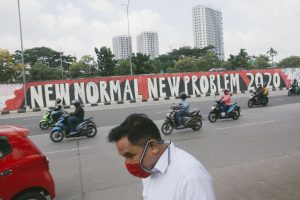Of Indonesia’s 34 provinces, Jakarta is one of the regions with the highest COVID-19 transmission rates so far.
The local government issued a large-scale policy of social restrictions starting from April 10 to curb the spread of COVID-19. The regulations closed a number of public facilities, including offices, schools, houses of worship, and business centers. Most workers were forced to work from home — if they still had jobs at all.
After nearly three months of restrictions, the government adopted new orders for life in the capital. Jakarta Governor Anies Baswedan said that he chose to name this new stage the “transition era” rather than the new normal, in an attempt to sound more familiar to people.
Anies said the word “transition” indicates that the efforts to tackle the spread of COVID-19 are not over. The transition phase is supposed to be a path to a safe, healthy and productive society, like the national government policies implementing a new normal.
In the transition period, Jakarta residents can already carry out social and economic activities even though there are a number of restrictions and conditions that must be met. Those who leave the house are encouraged to continue implementing health protocols, to reduce the risk of contracting the coronavirus that causes COVID-19.
Various public facilities and transportation operations are gradually reopening. Houses of worship and outdoor sports facilities opened on June 5. Offices, independent restaurants, museums, shops and retail outlets, and vehicle repair shops followed suit. Online two-wheeled transportation services such as Grab and Gojek are allowed to pick up passengers starting from June 8.
Agoes Rudianto is a Jakarta-based independent photographer.















































